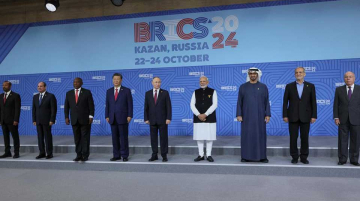
By Bruno Binetti
The decision of the BRICS to invite Argentina to become a full member in 2024 came as a surprise even to the Argentine government. President Alberto Fernández had lobbied to enter the club, but the expectations were so low he did not even send a high-level official to Johannesburg, unlike the other five newly invited members (Egypt, Ethiopia, Iran, Saudi Arabia and the United Arab Emirates).
The surprise is understandable. Argentina’s economy is declining rather than emerging: GDP has been flat for a decade, inflation is skyrocketing, and the country faces a 44-billion-dollar debt showdown with the International Monetary Fund. While Argentina is the third largest Latin American economy -behind Brazil and Mexico- and a member of the G20, it hardly comes to mind when one thinks of rising powers in the Global South.
The inclusion of Argentina was due to Brazilian president Lula da Silva’s support, who had initially resisted China’s intention to expand BRICS. For Fernández, entering BRICS is an opportunity to cement Argentina’s diplomatic status and find alternative sources of financing, such as the New Development Bank. Recently, Argentina tapped into an 18-billion-dollar swap agreement with the Chinese central bank to cover payments to the IMF and encouraged the use of the renminbi in bilateral trade with Beijing.
And yet, the invitation is badly timed because Argentina is in the middle of a presidential campaign. Whether to join the BRICS or not will come down to the new president, who will take office in December.
The two main opposition candidates have already rejected the possibility. The Libertarian Javier Milei wants to adopt the US Dollar as the national currency, refuses to negotiate with “communists” and intends to align the country with the United States and Israel. And the centre-right candidate Patricia Bullrich is opposed to joining the BRICS due to Iran’s membership, a country accused of being behind two terrorist attacks in Buenos Aires in the 1990s.
A tense political environment makes it difficult for Argentine elites to evaluate membership of BRICS on its merits. It is true that Argentina needs good relations with Washington, no less given the US Treasury’s influence over the IMF. If Beijing succeeds in its attempt to turn BRICS into a more neatly anti-Western alliance, Argentina might find itself in an awkward position.
At the same time, Brazil, India, Egypt and Saudi Arabia would surely refuse to align themselves squarely with Beijing against the United States, providing Argentina with diplomatic wiggle room within BRICS. Further, even a pro-US Argentine government might want to leverage its membership of BRICS to gain concessions from both Beijing and Washington. After all, Brazil, China and the US – in that order – are Argentina’s largest trading partners, and both China (through swap lines and loans) and the United States (via the IMF) are key creditors of Argentina.
In an increasingly multipolar and confrontational international system, occupying at unexpected seat at the table in the most prominent forum for developing countries is something Argentina’s next president should consider carefully. If exercised professionally and as part of a long-term strategy, membership in BRICS might help Argentina navigate a complex world and alleviate its domestic problems.
Bruno Binetti is a Member of the China Foresight Forum at LSE IDEAS and a non-resident fellow at the Inter-American Dialogue.








